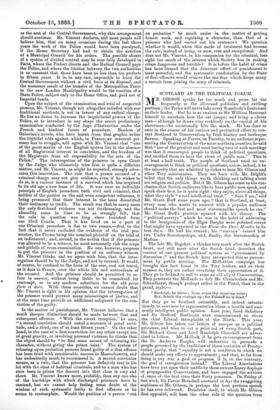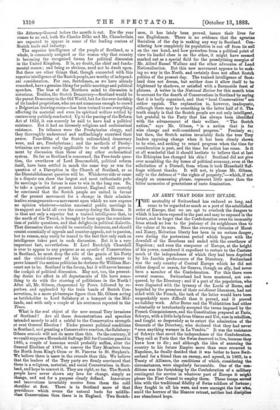SCOTLAND AS THE POLITICAL FORUM.
MR. GIBSON speaks far too much and poses far toe frequently as the all-round politician and rattling partisan ; the Tories will never take every Somebody's lieutenant as their leader. But ho is as anxious as Sir William Harcourt himself to ascertain how the cat jumps; and being a clever' man—although he draws very recklessly on the capital of his cleverness—he occasionally hits the mark. He has done so once in the course of his curious and protracted effort to con- vert Scotland to Conservatism by Irish blarney and burlesque finance. Speaking at Forres, on Tuesday, to an audience repre- senting the Conservatism of the more northern counties, he said that "one of the greatest and most lasting uses of such meetings was that it encouraged people to think of political questions, and enabled them to hear the views of public men." This %- at least a half-truth. The people of Scotland need no en- couragement to think on political questions, unless, indeed, it be the minority that are admitted by ticket to hear Mr. Gibson and other Tory missionaries. They are born with Mr. Bright's belief that the only things worth thinking and talking about are religion and politics. But if Mr. Gibson has come to the con- clusion that Scotch audiences like to hear public men speak, and'. speak their best, he is quite right ; they enjoy, above all things, what they style "a real intellectual treat." "Sure I am," said' Mr. Grant Duff some years ago, "that in Scotland, at least, every man who wants to succeed with a popular audience should make the best and most statesmanlike speech he can." Mr. Grant Duff's practice squared with his theory. The "political surveys" which he was in the habit of addressing to the bourgeoisie of the Elgin Burghs were polished essays that might have appeared in the Revue des Deux Mondes in its best days. He had his reward ; his " surveys " earned him two Under-Secretaryships, and, finally, the Governorship of' Madras.
The late Mr. Bagehot, a thinker very much after the Scotch heart, and still more after the Scotch head, describes the essence of our present political system as "government by discussion ;" and the Scotch have interpreted this as govern- ment by public meeting. The Midlothian campaign has brought this fact home to the Tory leaders, and as their manner is, they are rather overdoing their appreciation of it. They go to Ireland to call to arms an old ally of Conservatism. They penetrate the Midlands to defy Mr. Chamberlain and Mr.' Schnadhorst, though perhaps rather in the Pistol, than in the grand, style,—
‘• Bardelph, bo blithe; Nym, rouse thy vaunting veins ; Boy, bristle thy courage up; for Falstaff he is dead."
But they go to Scotland ostensibly, and indeed ostenta- tiously, to convince by argumentation alone, a hostile and emi- nently intelligent public opinion. Last year, Lord Salisbury and Sir Stafford Northcote were commissioned to atom the chief Liberal strongholds of the North. This year, Mr. Gibson has taken out letters of marque as a political privateer, and tries to cut a prize out of every Scotch port.' Sir Richard Cross and Lord Randolph Churchill are adver- tised to follow. Mr. Mallock, if he gets encouragement from the St. Andrews Burghs, will endeavour to persuade a people governed by the traditions of three centuries of Presby- terian parity, that "equality is not a condition to which we should make any efforts to approximate ; and that, Ito far from being in any *ay a goal of progress, it is, on the contrary, the goal of retrogression instead." The Liberal Associations have been put upon their mettle by these extraordinary displays of propagandist Conservatism, and have engaged the services of. some of the best stars their Party possesses. On Friday of last week, Sir Farrer Herschell answered at Ayr the swaggering sophisms of Mr. Gibson, in perhaps the best partisan speech: he has ever delivered. Dumfries itself, to which Mr. Gibson first appealed, will hear the other side of the question from the Attorney-General before the month is out. Ere the year COMB to an end, both Sir Charles Mike and Mr. Chamberlain are expected to appear in some of the leading centres of Scotch trade and industry.
The superior intelligence of the people of Scotland, as a whole, is commonly assigned as the reason why that country is becoming the recognised forum for political discussion in the United Kingdom. Ms, no doubt, the chief and funda- mental reason ; and being so obvious, need not be dwelt upon. But there are other things that, though connected with this superior intelligence of the Scotch people, are worthy of independ- ent consideration. For one, Scotchmen, as we have already remarked, have a genuine liking for public meetings and political speeches. The bias of the Northern mind to discussion is notorious. Besides, the Scotch Democracy—Scotland would be the purest Democracy in the Old World, but for the over-lordship of its landed proprietors, who are not numerous enough to crowd a Belgravian drawing-room—has been trained to see everything affecting its material and even its spiritual welfare settled by controversy publicly conducted. Up to the passing of the Reform Act of 1832, it can scarcely be said to have had a political existence. But it had an intensely religious and ecclesiastical existence. Its tribunes were the Presbyterian clergy, and they thoroughly understood and unflinchingly exercised their power. Four-fifths of the Scotch enfranchised democracy were, and are, Presbyterians and the methods of Presby- terianism are more easily -applicable to the work of govern- ment by discussion than those of any other ecclesiastical system. So far as Scotland is concerned, the Free-trade ques- tion, the overthrow of Lord Beaconsfield, political reform itself, have been settled in much the same way as was the question of a Disruption in the Church of Scotland, or as the Disestablishment question will be. Whichever side or cause in a dispute can show the largest and most enthusiastic pub- lic meetings in its favour is sure to win in the long run. So, to take a question of present interest, England will scarcely be convinced that the Scotch people are united in favour of the present movement for a change in their adminis- trative arrangements—a movement upon which we now express no opinion whatever—unless successful public meetings in its support are held all over the country during the Recess. It is thus not only a superior but a trained intelligence that, to the north of the Tweed, is brought to bear upon the considera- tion of public questions, and that delights in political dialectic. That discussion there should be essentially decorous, and should consist essentially of appeals and counter-appeals, not to passion, but to reason, may easily be traced to the fact that only such an intelligence takes part in such discussion. But it is a very important fact, nevertheless. If Lord Randolph Churchill is ever to appear to any purpose as an apostle of Conservatism in Scotland, he must drop the role of the gamin of his Party and the vitriol-thrower of his caste, and endeavour to prove himself the serious politician he declares Sir William Har- court not to be. Scotland is the forum, but it will never become the cockpit of political discussion. May not, too, the present- day desire for effect in all departments of life have some- thing to do with the starring of politicians in the North? After all, Mr. Gibson, chaperoned by Peers, followed by re- porters, and applauded by the train bands of Scotch Con- servatism, is a more picturesque figure than Mr. Gibson acting as bottleholder to Lord Salisbury at a banquet in the Mid- lands, and with only a couple of his sentences reported in the Times.
What is the real object of the now annual Tory invasions
of Scotland Are all these demonstrations and speeches intended merely to add a cabful to the Conservative strength at next General Election ? Under present political conditions in Scotland, and granting a Conservative reaction, the Salisbury- Gibson crusade will not do more than this. On the contrary, if we could suppose a Household Suffrage Bill for Counties passed in 1885, a couple of hansoms would probably suffice, after the General Election of 1886, to convey the Tory Members from the North from King's Cross or St. Pancras to St. Stephen's. We believe there is more in the crusade than this. We believe that the leaders of the Tory party are firmly convinced that there is a religious, material, and social Conservatism in Scot- land, and hope to convert it. They are right, so far. The Scotch people have never shown any love for change, simply as change, and not for a purpose clearly defined. Innovators and innovations invariably receive from them the cold shoulder at first. There is in Scotland more of that providence which seems the natural basis for middle- class Conservatism than there is in England. Two Scotch- men, it has lately been proved, insure their lives for one Englishman. There is no evidence that the agrarian Socialism of the day is making any way in Scotland. Con- sidering how completely its population is cut off from its soil on the one hand, and how powerless from a political point of view its landed class is on the other, it might have seemed marked out as a special field for the proselytising energies of Mr. Alfred Russel Wallace and the other advocates of Land Nationalisation. But this new movement appears to be mak- ing no way in the North, and certainly does not affect Scotch politics of the present day. The trained intelligence of Scot- land does not dream, but neither does it allow itself to be frightened by shadows, or satisfied with a Barmecide feast of phrases. A writer in the National Review for this month tries to account for the dearth of Conservatism in Scotland by saying that it is badly organised, and that "local Conservatives" are rather uppish. The explanation is, however' inadequate, although there may be something in the latter half of it. The truth simply is that the Scotch people are not only intelligent, but grateful to the Party that has always been identified with the advancement of their welfare. "The Scotch nation," says Mr. Gibson, "is a nation that is for wise change and well-considered progress." Precisely so ; but then, the Scotch nation invariably finds the true Tory leaders opposing change when it has been clearly shown to be wise, and seeking to retard progress when the time for consideration is past, and the time for action has come. Is it at all wonderful that it should hesitate to believe that at last the Ethiopian has changed his skin ? Scotland did not give over mumbling the dry bones of political economy, even at the solicitation of a Disraeli, from whom it took Household Suf- frage without thanks. It will not, to please Mr. Gibson, rally to the defence of " the rights of property,"—which, if not simply an unmeaning phrase, represent little more than the bitter memories of generations of caste domination.



































 Previous page
Previous page